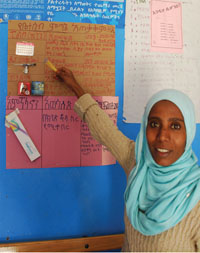1.5 Family planning programme in Ethiopia
The modern family planning service in Ethiopia started as The Family Guidance Association of Ethiopia (FGAE), established in 1966. FGAE’s only family planning services were provided from a single-room clinic run by one nurse, at the former St Paul Hospital in Addis Ababa. FGAE’s programme activities and services are now broadly spread all over the country, creating a vast network.
In the last 20 years, with the adoption of the population policy in 1993, numerous local and international partners in family planning have come together to assist the government in expanding family planning programmes and services. The National Population Office was established to implement and oversee the strategies and actions related to the population policy. In 1996, the Ministry of Health released Guidelines for Family Planning Services in Ethiopia to guide health providers and managers, as well as to expand and ensure quality family planning services in the country.

The Ministry of Health designed new outlets for family planning services in the form of community-based distribution, social marketing and work-based services, in addition to the pre-existing facility-based and outreach family planning services. Social marketing is about making available family planning methods at an affordable price using private retailers. Work-based services are services made available to users’ at their place of work, such as factories, prisons and schools. Moreover, in the last decade, integration and linkage between family planning services and HIV/AIDS care, along with maternal and other reproductive health services, has been emphasised in guidelines and strategic documents with the aim of enhancing family planning utilisation.
Currently, the service has been provided to rural communities at household level through the Health Extension Programme (Figure 1.3). Access to these services has been almost universal for all urban and rural communities, so that every woman in the population can get any contraceptive method of her choice free of charge. This is covered in more detail in the next study session.
See Table 1.1 for a summary of these services.
| Service delivery levels | |||
|---|---|---|---|
| Delivery points | Household/ Health post | Health centre and rural hospital | Referral hospital |
| Type of service | Condoms, oral contraceptives, injections and single rod implants (Implanon), as well as counselling. | Condoms, oral contraceptives, injections, multiple rod implants (Jadelle and Norplants) and Intrauterine contraceptive devices (IUCDs), as well as counselling. | All types of services including Voluntary Surgical Procedures (VSG) and counselling. |
1.4.2 Benefits of family planning
